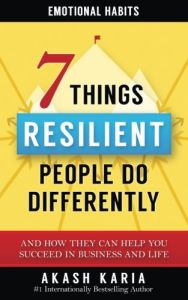Join getAbstract to access the summary!

Join getAbstract to access the summary!
Akash Karia
Emotional Habits
7 Things Resilient People Do Differently (And How They Can Help You Succeed in Business and Life)
CreateSpace, 2016
What's inside?
“Emotionally resilient” people accept their feelings and take responsibility for their actions.
Recommendation
Peak performance coach Akash Karia discusses the seven major habits of “emotionally resilient” people and explains how to integrate these behaviors into your life. Experts claim that the most successful people aren’t necessarily the most intelligent or best educated; they’re the most emotionally resilient. They don’t let negative emotions cloud their judgment. Instead, they acknowledge such feelings as being inevitable and take responsibility for their actions. They can step back from a situation and not allow their emotions to take over. Karia provides tips for handling negativity, including adopting power poses, changing focus, using questions to develop greater self-awareness, and more. His easy-to-read manual contains valuable advice backed up by research. getAbstract recommends Karia’s useful method to anyone dealing with sadness, anger, frustration or other negative emotions.
Summary
About the Author
Akash Karia is a speaker and peak performance coach who specializes in resilience training. He has trained more than 80,000 people around the world.




















Comment on this summary